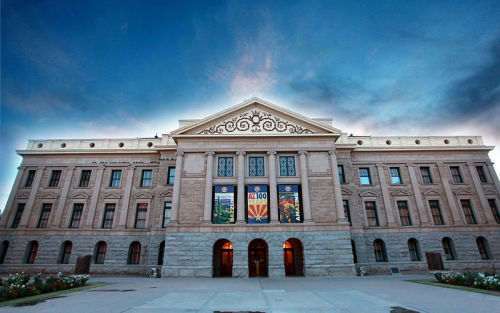PHOENIX — The Martin Luther King Jr. holiday kept the work week short for the Arizona Legislature as both houses get normal business going after their syllabus week.
Gov. Doug Ducey’s budget proposal remained at the top of the news after the three-day weekend as the Capitol gears up for another series of budget battles.
A fee or a tax?
Ducey promised not to raise taxes and his budget proposal includes just that. He did, however, put in the proposal that the state fund the Arizona Highway Patrol through the Motor Vehicle Registration fee.
Outgoing state budget director John Arnold said in a presentation to the Joint Appropriations Committee on Tuesday that the goal in the budget proposal is to have the fee cover 50 percent of the Highway Patrol, which amounts to about $65 million. The current Motor Vehicle Registration fee is $8 and raises about $35 million.
The proposal would have the fee increased by up to $7 to ensure it raises an additional $30 million.
Senate Minority Leader Katie Hobbs, D-Phoenix, called it a tax and asked Arnold if it would require two-thirds approval from the Legislature in accordance with voter-approved Proposition 108. Arnold said they would talk through it.
If you can’t beat ‘em, change the Constitution
The budget proposal also includes moving the State Land Department to a self-funding structure for $12.5 million, which had been previously struck down as unconstitutional by the Arizona Supreme Court.
“Many of you may say, ‘Now wait a minute, we tried that. It went to the Supreme Court and the Supreme Court said you can’t do that.’” Arnold said. “For that reason, we’re proposing a constitutional change.”
Rep. Justin Olson, R-Mesa, asked Arnold if the governor’s office had developed any sort of election strategy for amending the state Constitution. Arnold said it had not developed any sort of strategy yet.
“If the goal is have structural balance and we’re going to rely on passage at the ballot, then I think we need to take it with a grain of salt,” Olson said.
Kavanagh and the panhandler
Sen. John Kavanagh, R-Fountain Hills, is taking on panhandlers starting with a bill that would ban them from stopping traffic with a pedestrian signal when they have no intention to cross.
At Senate Public Safety, Military and Technology Committee on Wednesday, Kavanagh related a personal story as one of the reasons why he introduced the bill. He said he was driving home from the Legislature one day during rush hour when he encountered someone soliciting money from cars on a freeway off-ramp. When the light would turn green, the man would hit the pedestrian crosswalk button to make the cars stop sooner so he could solicit more.
The offense would be categorized as a Class 3 misdemeanor. That carries a penalty of up to 30 days in jail and up to a $500 fine, which would likely require quite a few hours of panhandling to pay off should this bill become law.
With the exception of one absent member, the committee voted unanimously to approve the measure, known as SB 1063.
Kavanagh is also sponsoring SB 1094, which would make it a crime to solicit money on public transportation and within 15 feet of a bank or an ATM.
State of Education is “poor”
State Superintendent Diane Douglas arrived at the Capitol Wednesday to speak before the House Education Committee and tell it something many Arizonans likely already know – the state’s education system is getting some failing grades.
Douglas said the state of education in Arizona is “poor,” citing rankings from Education Week. The state is ranked 47th in the nation in education with a “D+” grade.
Douglas cites the implementation of common core standards as the No. 1 problem facing Arizona’s education system now. She also said student assessments cannot take the place of teachers connecting with students.
“Standards and high-stakes testing measures demographics, not student achievement or teacher performance,” Douglas said.
This comes less than a week after the Legislature passed and the governor signed into law a new high-stakes assessment with the civics test now a requirement for Arizona students to pass for high school graduation.
She also took some shots at Tucson Unified School District’s Mexican American Studies program without mentioning it by name when she said teaching students by ethnicity amounts to “academic segregation.”
Indian Nations and Tribes Legislative Day
The Capitol celebrated Indian Nations and Tribes Legislative Day on the Senate floor Tuesday morning with several representatives from Native American tribes and communities across the state taking time to speak.
This comes less than three weeks after the death of former Rep. Lloyd House, the first Native American elected to the Legislature. Last week, the Legislature passed House Concurrent Resolution 2011 honoring the Navajo representative and former Code Talker who was first elected in 1966.
Committee votes
Unlike the fast-tracked civics bill last week, many of the bills introduced are making their way through committee approval on the long trek through the Capitol in becoming laws.
— The Senate Education Committee voted to approve SB 1052, which would make it a bit easier to sponsor a charter school by allowing smaller community colleges to do so.
— The Senate Public Safety, Military and Technology Committee voted to raise the cap on prisoners’ pay. Should it become a law, SB 1002 would raise compensation for working inmates from 50 cents an hour to $1.50 an hour.
— The House Committee on Government and Higher Education approved HB 2094, which requires landlords of mobile homes to be responsible for the maintenance of trees on their tenants’ property.
Ethan McSweeney is the Bolles Fellow from the University of Arizona covering the Legislature for Arizona Sonora News. Reach him at [email protected]


